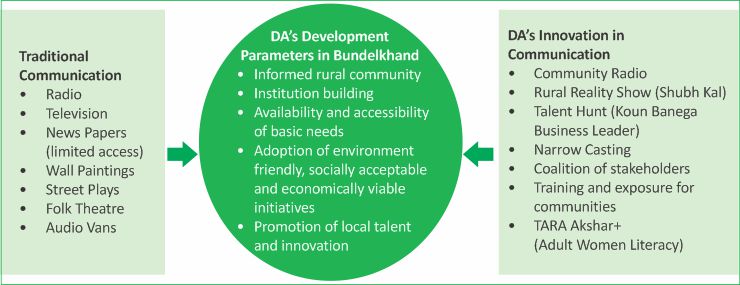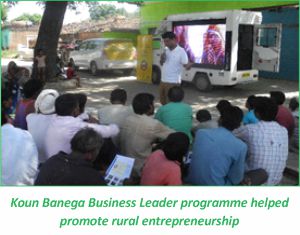|
Merging Innovation and
Traditional Rural communication is an interactive process in which information, knowledge and skills relevant for development are exchanged between rural communities, extension/advisory services and information providers either personally or through some media such as radio, print and more recently the new ‘Information and Communication Technologies’ (ICTs). The aim is to put rural people in a position to have the necessary information for informed decision-making and the relevant skills to improve their livelihoods. Development Alternative’s Model of Communication in Rural Development Development Alternatives Group (DA) has been working for the last 30 years in Bundelkhand, an extremely drought prone and poor region in Central India. When DA started its interventions, a big missing point was a huge communication gap between different stakeholders. The organisation has designed a rural communication model focused on building capacities of the rural population to improve their livelihoods. The emphasis has been on innovation, creating a two-way flow of information and merging new communication tools with traditional communication.
TARA Akshar+ Using technology-based communication tools, TARA Akshar+, an adult literacy programme of DA has made more than 1 lakh adult women in Bundelkhand literate and resulted in opening the door for prosperity for these women as many of them have started their own entrepreneurial ventures after becoming literate. Community Radio
Radio
Bundelkhand, community radio setup by the Development Alternatives Group
(DA) has been contributing vastly in minimising the information gap
through two-way communication to more than two lakh people of the
backward Bundelkhand region. Narrow casting is used as a special
communication tool which helps in spreading information beyond the
coverage area of community radio to nearly one lakh people. Shubh Kal programme – Over the past 1 decade, community radio reporters trained in climate change journalism have served as an effective two way communication link at the grassroots between farmers, government officials from sectoral line departments and scientific experts from agriculture extension agencies such as Krishi Vigyan Kendras to promote climate efficient agricultural practices in Bundelkhand which is an extremely vulnerable region to climate impacts. Anil Goswami, a farmer from Khaurgar village in Shivpuri district stated, “Earlier we did not know how chemical based farm produce adversely affects our health. When we heard the scientist from the Krishi Vigyan Kendra explain the ill effects of chemical fertilizers on our soil health and our own health in a Shubh Kal programme, many of us stopped using chemical fertilizers and have started experimenting with organic composts. We also found the information on a government subsidy scheme on vermi composting being talked about by a government official useful.” Listening to the Shubh Kal radio programmes, community members have become familiar with new options and government schemes related to climate change adaptation such as line sowing, drip irrigation techniques, water harvesting measures, soil testing, organic composting methods, drought resistant seed varieties, subsidies on constructing farm ponds, subsidies on bio gas plants etc.
Koun
Banega Business Leader (KBBL) has been a major rural talent hunt
The innovative programme was designed as a social innovation platform to create opportunities that lead to job creation among backward communities. The three categories of entrepreneurs identified during the making of KBBL programme were: existing youth entrepreneurs, aspiring youth entrepreneurs and women entrepreneurs. Eventually, 6 participants - 4 males and 2 females - emerged as winners. The criteria for this selection was manifold - clarity and novelty of business idea and model, influence and connectivity in marketing and business networks, willingness, passion, communication and leadership skills, and social value of the business. It was undertaken as a part of the Work 4 Progress initiative of Development Alternatives and la Caixa Banking Foundation. Stakeholders’ Coalition Stakeholders’ coalition to bridge the gap between policy and practice along with creating eco-system for enterprise development has created more than 10,000 enterprises directly and influenced more than 50,000 entrepreneurs. The stakeholders’ coalition platform brings policy makers, government officials, bankers, development practitioners and community members all together for sustainable and green job creation. Development Alternative Group’s innovation in rural communication models has resulted in informing and empowering the community to become change agents and simultaneously, it has helped in strengthening various stakeholders and helped in building an ecosystem for sustainable development of one of the poorest and most backward regions in India. ■
Gunjesh Kumar
|


 programme run on Radio Bundelkhand, DA’s community radio for promoting
rural entrepreneurship. More than 150 villages of approximately 1 lakh
people were directly reached through KBBL which helped in creating
sustainable livelihood prospects and building an eco-system for
enterprise development.
programme run on Radio Bundelkhand, DA’s community radio for promoting
rural entrepreneurship. More than 150 villages of approximately 1 lakh
people were directly reached through KBBL which helped in creating
sustainable livelihood prospects and building an eco-system for
enterprise development.